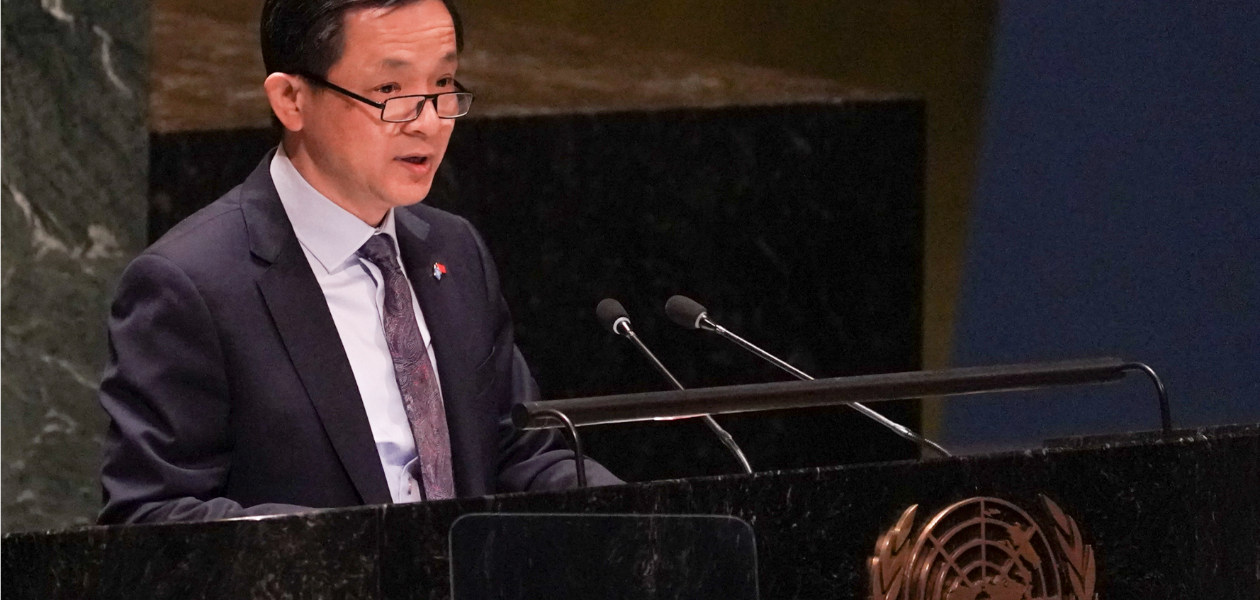
China on Friday called for a comprehensive ceasefire and negotiations to end the war in Ukraine and issued a 12-point plan to achieve peace. China rolled out its plan at the United Nations and in the international press over the weekend.
“Conflict and war benefit no one,” declared a statement from the Ministry of Foreign Affairs in Beijing. “All parties must stay rational and exercise restraint, avoid fanning the flames and aggravating tensions, and prevent the crisis from deteriorating further or even spiraling out of control.”
The plan, discussed in detail below, calls for an immediate cease of hostilities, gradual de-escalation, protections for civilians, keeping nuclear facilities safe, and more.
The call was followed almost immediately by a statement from Ukrainian President Volodymyr Zelensky that he was open to considering parts of the plan. Zelensky said he wanted to meet Chinese President Xi Jinping. “China historically respects our sovereignty,” Zelensky told the media. A meeting between him and Xi would “benefit our countries and the security in the world,” he said.

In Moscow, Foreign Ministry spokeswoman Maria Zakharova said Russia was also open to China’s plan and wanted a “diplomatic and political settlement to the war.”
Brazil’s President Lula came out in support of the China peace plan saying, “It is urgent that countries not involved in the conflict assume responsibility for leading the push for talks to reestablish peace.”
As those encouraging statements hit the newswires, U.S. diplomats and the Biden administration lost no more than a few minutes in coming out to condemn the peace plan, with Secretary of State Antony Blinken calling any ceasefire a “ruse” that Russia would use to rearm.
In an interview with ABC News Friday evening, President Joe Biden himself trashed the proposal, without commenting on any of its components. Asked by a reporter what he thought of the Chinese plan “applauded by Putin,” Biden said the journalist had answered his own question.
“Putin’s applauding it, so how could it be good?” he mused. “The idea that China is going to be negotiating the outcome of the war…is just not rational.” He claimed China’s attempt at brokering peace would only benefit Russia.
Following the dismissals from Washington, by Sunday, Zelensky reversed course. He stopped talking about his interest in parts of the Chinese peace plan. Instead, he resumed requests for more weapons shipments, again saying Ukraine needs F-16 fighter jets to retake Crimea.
Sabotaging peace by trashing China
The Biden administration, meanwhile, continued to ramp up attacks against China and distract attention from the details of its peace proposal. Claims that China was considering selling arms to Russia, an allegation contested by China even before it released its ceasefire proposal, were repeatedly made by U.S. officials in the media throughout the weekend.
The Chinese foreign ministry reminded the world, however, that it was the United States and NATO that are pouring arms into the conflict, not China. To date, the U.S. has funneled over $32 billion into the war.
Cable television networks added to the attacks on the Chinese peace proposals by airing segments all weekend pushing the message that unless Ukraine wins a total victory in the war, then China will be emboldened to make a move to “grab” Taiwan.
Michael McCaul, the former U.S. ambassador to Russia, incredibly said on MSNBC over the weekend that “only by escalating the war right now can we wind up eventually with peace.” His comments were reminiscent of the “War is Peace” slogans made infamous by George Orwell’s book, 1984.
And in a case of politically convenient timing, the U.S. government undermined serious discussion of the Chinese peace plan by choosing the current moment to once more dredge up the coronavirus origins debate. In a scoop given exclusively to the Wall Street Journal, the U.S. Department of Energy made public the fact that it sent a “classified intelligence” report to Congress concluding that the COVID-19 pandemic likely arose from a laboratory leak in China.
No evidence for the fresh claim was provided.
The Energy Department report, which wasn’t requested by Congress, is apparently less than five pages long. It is also unclear why the Energy Department is issuing an intelligence report, other than the fact that it oversees the U.S.’ own network of laboratories.
Buried in the Wall Street Journal article is the admission that the National Intelligence Council only makes the claim of a China lab leak with “low confidence.” For such a national media circus to ensue over an evidence-free Energy Department report that has a low level of confidence suggests that distraction from the Chinese peace proposal may have been the goal all along.
The quick support of the allegation offered by some right-wing politicians suggests that the current Administration is moving closer to the line taken by the Trump administration, which referred to COVID-19 as “the China virus.”
Republican Sen. Dan Sullivan of Alaska told NBC on Sunday he now plans to initiate extensive Congressional hearings on the pandemic’s origins. Backing Biden and attacking China, Sullivan said, “This is a country that has no problem coming out and lying to the world.”
Moscow’s “stressful” analysis
While the Biden administration and some in the U.S. Congress were eager to toss the Chinese proposals aside, in Russia, the official response was to welcome Beijing’s efforts but also tamp down any hopes for a quick resolution to the war.
“Any attempts to develop plans that will help transfer the conflict to a peaceful course deserve attention,” said Kremlin press secretary Dmitry Peskov. He told the RIA Novosti news agency that the government of Vladimir Putin will treat the Chinese plan “with great attention,” but emphasized that the details would have to be the subject of “careful analysis,” which he said would take place in the course of a “very lengthy and stressful process.”
Commenting on the Chinese proposal, the Russian Foreign Ministry noted that any peace would have to involve Ukraine recognizing “new territorial realities,” referring to Russia’s annexation of Donetsk, Luhansk, Kherson, and Zaporizhzhia, as well as Crimea. There was also no mention of any withdrawal of troops from Ukrainian territories.
Given Zelensky’s demand again this weekend that Russia withdraw completely to the 1991 post-Soviet borders between the two countries, the Russian position likely forecloses any early breakthroughs when it comes to negotiations.
Regardless of the entrenched positions by Russia and Ukraine, as well as U.S. resistance to negotiations, China appears to remain committed to making an attempt at brokering an end to the fighting.

A Monday morning article in People’s Daily, the newspaper of the Communist Party of China, said that President Xi Jinping was clear on China’s stance: “Conflicts and wars produce no winner, there is no simple solution to a complex issue, and confrontation between major countries must be avoided.”
The paper said that “Ukraine’s sovereignty and security should be upheld” and “Russia’s legitimate security interests should also be respected,” referring to NATO encroachments from the west. At the same time, it said the “peace and stability” of the whole of Europe has to be defended.
China’s Plan for Peace in Ukraine
China’s 12-point peace plan begins with a call for a comprehensive ceasefire and negotiations. The 12 points were as follows:
-
The negotiations must take place on a foundation of respect for the sovereignty of all countries. Universally recognized international law, including the purposes and principles of the United Nations Charter, must be strictly observed. The sovereignty, independence, and territorial integrity of all countries must be effectively upheld. All countries, big or small, strong or weak, rich or poor, are equal members of the international community. All parties should jointly uphold the basic norms governing international relations and defend international fairness and justice. Equal and uniform application of international law should be promoted, while double standards must be rejected.
-
Abandoning the Cold War mentality. The security of a country should not be pursued at the expense of others. The security of a region should not be achieved by strengthening or expanding military blocs. The legitimate security interests and concerns of all countries must be taken seriously and addressed properly. There is no simple solution to a complex issue. All parties should, following the vision of common, comprehensive, cooperative, and sustainable security—and bearing in mind the long-term peace and stability of the world—help forge a balanced, effective, and sustainable European security architecture. All parties should oppose the pursuit of one’s own security at the cost of others’ security, prevent bloc confrontation, and work together for peace and stability on the Eurasian Continent. [Achievement of this second point in the plan would require major changes in the way NATO and the U.S. have pushed the expansion of their alliance and agreement by Ukraine that it not become part of NATO.]
-
Ceasing hostilities. Conflict and war benefit no one. All parties must stay rational and exercise restraint, avoid fanning the flames and aggravating tensions, and prevent the crisis from deteriorating further or even spiraling out of control. All parties (and this includes the United States and Europe) should support Russia and Ukraine in working in the same direction and resuming direct dialogue as quickly as possible, so as to gradually de-escalate the situation and ultimately reach a comprehensive ceasefire.
-
Resuming peace talks. Dialogue and negotiation are the only viable solution to the Ukraine crisis. All efforts conducive to the peaceful settlement of the crisis must be encouraged and supported. The international community should stay committed to the right approach of promoting talks for peace, help parties to the conflict open the door to a political settlement as soon as possible, and create conditions and platforms for the resumption of negotiation. China will continue to play a constructive role in this regard.
-
Resolving the humanitarian crisis. All measures conducive to easing the humanitarian crisis must be encouraged and supported. Humanitarian operations should follow the principles of neutrality and impartiality, and humanitarian issues should not be politicized. The safety of civilians must be effectively protected, and humanitarian corridors should be set up for the evacuation of civilians from conflict zones. Efforts are needed to increase humanitarian assistance to relevant areas, improve humanitarian conditions, and provide rapid, safe and unimpeded humanitarian access, with a view to preventing a humanitarian crisis on a larger scale. The U.N. should be supported in playing a coordinating role in channeling humanitarian aid to conflict zones.
-
Protecting civilians and prisoners of war (POWs). Parties to the conflict should strictly abide by international humanitarian law, avoid attacking civilians or civilian facilities, protect women, children, and other victims of the conflict, and respect the basic rights of POWs. China supports the exchange of POWs between Russia and Ukraine and calls on all parties to create more favorable conditions for this purpose.
-
Keeping nuclear power plants safe. China opposes armed attacks against nuclear power plants or other peaceful nuclear facilities and calls on all parties to comply with international law including the Convention on Nuclear Safety (CNS) and resolutely avoid man-made nuclear accidents. China supports the International Atomic Energy Agency (IAEA) in playing a constructive role in promoting the safety and security of peaceful nuclear facilities.
-
Reducing strategic risks. Nuclear weapons must not be used, and nuclear wars must not be fought. The threat or use of nuclear weapons should be opposed. Nuclear proliferation must be prevented and nuclear crisis avoided. China opposes the research, development, and use of chemical and biological weapons by any country under any circumstances.
-
Facilitating grain exports. All parties need to implement the Black Sea Grain Initiative signed by Russia, Turkey, Ukraine, and the U.N. fully and effectively in a balanced manner, and support the U.N. in playing an important role in this regard. The cooperation initiative on global food security proposed by China provides a feasible solution to the global food crisis.
-
Stopping unilateral sanctions. Unilateral sanctions and maximum pressure cannot solve the issue; they only create new problems. China opposes unilateral sanctions unauthorized by the U.N. Security Council. Relevant countries the United States should stop abusing unilateral sanctions and “long-arm jurisdiction” against other countries, so as to do their share in deescalating the Ukraine crisis and create conditions for developing countries to grow their economies and better the lives of their people.
-
Keeping industrial and supply chains stable. All parties should earnestly maintain the existing world economic system and oppose using the world economy as a tool or weapon for political purposes. Joint efforts are needed to mitigate the spillovers of the crisis and prevent it from disrupting international cooperation in energy, finance, food trade and transportation and undermining the global economic recovery.
-
Promoting post-conflict reconstruction. The international community needs to take measures to support post-conflict reconstruction in conflict zones. China stands ready to provide assistance and play a constructive role in this endeavor.
People’s World has an enormous challenge ahead of it—to raise $200,000 from readers and supporters in 2023, including $125,000 during the Fund Drive, which runs from Feb. 1 to May 1.
Please donate to help People’s World reach our $200,000 goal. We appreciate whatever you can donate: $5, $10, $25, $50, $100, or more.














Comments